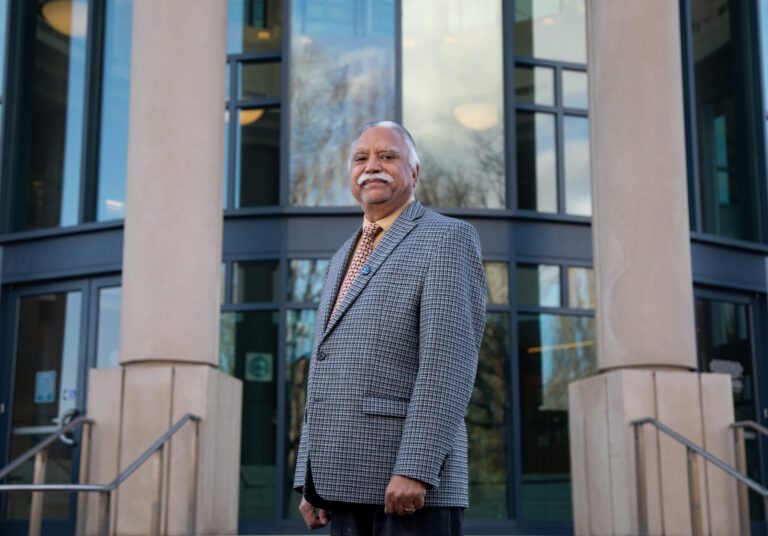Public drug use in Bellingham will become illegal in the coming weeks, but city leaders insist the new rule the city council approved on April 10 is not intended to brand people with substance use disorder as criminals.
Rather, city leaders said the ordinance that passed with a 5–2 vote is meant to help people who are addicted to drugs, while also making the city’s environment more business-friendly.
The vote took place in front of an overflow crowd in council chambers at City Hall. Many in attendance held signs that read “care over criminalization” and “treatment, not arrests.”
Council members decided to pass the ordinance even though they expect the state Legislature to pass a bill that would criminalize drug possession effective July 1. Local legislators have signaled to the council that Senate Bill 5536 is likely to become law. If the bill passes, the city ordinance might still stand because it considers public drug use to be a crime, not possession.
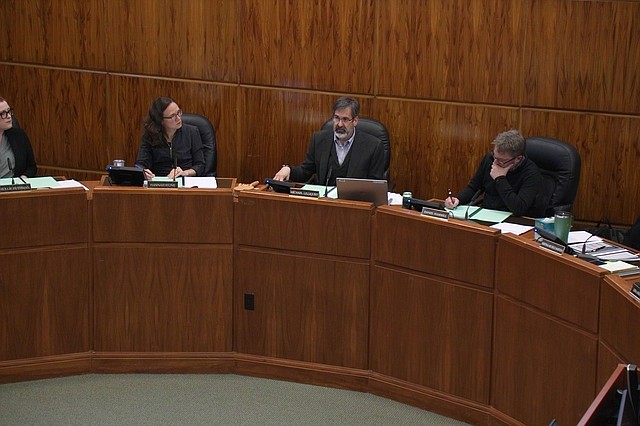 The Bellingham City Council debates the ordinance, which passed 5-2. (Hailey Hoffman/Cascadia Daily News)
The Bellingham City Council debates the ordinance, which passed 5-2. (Hailey Hoffman/Cascadia Daily News)
The ordinance takes effect on April 25, when public use of controlled substances will be a misdemeanor in Bellingham, with a maximum sentence of 30 days in jail. But city police and prosecutors told council members qualified suspects will be diverted into social service programs.
“We know that putting people in jail is not going to solve the issue,” said council member Lisa Anderson, who voted for the ordinance. “It’s, in some sense, an intervention.”
In any case, the jail is overcrowded and won’t accept those who are arrested under the new ordinance, Police Chief Rebecca Mertzig told the council.
A “vast majority” of police contacts under the new ordinance would be verbal warnings or citations, not arrests, Mayor Seth Fleetwood said in a memo to city council.
If someone found in violation of the new rule looks like a good fit, the city prosecutor’s office can refer the suspect into the county’s voluntary Law Enforcement Assisted Diversion program, or LEAD. A case manager would help the LEAD client find services, including addiction and mental health treatment, and housing.
LEAD has a small amount of room for additional clients, said Erika Lautenbach, director of the county Health and Community Services Department. The program has about 110 clients currently and has a capacity of 120 to 140, Lautenbach said.
But she warned city officials the county-run program cannot prioritize potential clients from Bellingham because it receives all of its funding from the state and federal governments, with no additional support from the city.
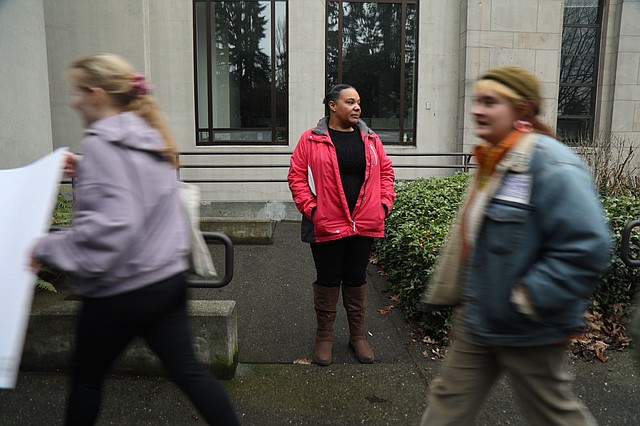 Bellingham City Council member Kristina Michele Martens watches protesters enter City Hall before the meeting. (Hailey Hoffman/Cascadia Daily News)
Bellingham City Council member Kristina Michele Martens watches protesters enter City Hall before the meeting. (Hailey Hoffman/Cascadia Daily News)
Council also had passed the ordinance 5–2 in an initial vote on March 27, after hearing the concerns of downtown business owners. A Downtown Bellingham Partnership survey indicated that public safety was business owners’ No. 1 concern, and 42% of the 53 businesses surveyed said they planned to close or relocate out of the downtown this year.
The April 10 vote made the prohibition on public drug use official through April 2025, due to a late change to the ordinance, introduced by council member Hannah Stone.
Council members Kristina Michele Martens and Michael Lilliquist opposed the measure in both votes.
Martens criticized the ordinance in a three-page memo provided to the council before the April 10 meeting. In the memo, Martens said a therapeutic court currently under development for the city’s municipal court should have been in place before drug use was criminalized. Therapeutic courts under state law keep drug offenders out of jail, offer treatment and then dismiss any charges that stemmed from drug use.
The ordinance won’t end up helping people, Martens said, but rather would push “incredibly vulnerable people who are experiencing crisis back into the shadows, where it will be even harder to provide them with help.”
“We’re not hoping to push people into the dark,” Fleetwood said at an afternoon committee meeting on Monday, in apparent response to Martens’ statement. “We’re saying that fentanyl should not be smoked in downtown streets because it’s dangerous for the individual that’s smoking it and for the public bystanders — and it’s scaring people away.”
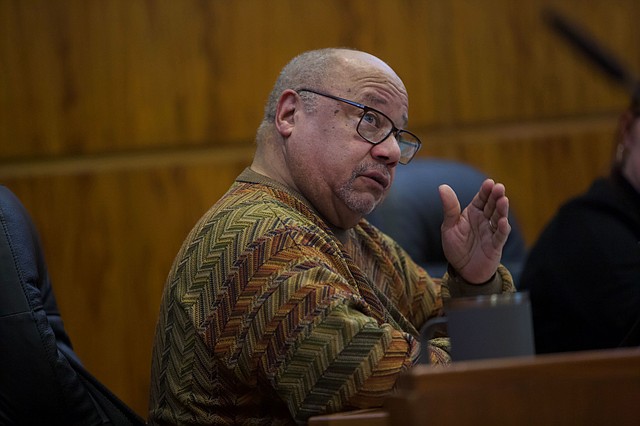 Council member Skip Williams explains his “yes” vote for the drug-use ordinance. (Hailey Hoffman/Cascadia Daily News)
Council member Skip Williams explains his “yes” vote for the drug-use ordinance. (Hailey Hoffman/Cascadia Daily News)
Several council members struck personal notes, speaking of their own family members’ experiences with drug addiction. Council member Skip Williams, speaking in support of the ordinance, said two members of his family found their way out of addiction after being arrested.
Under these circumstances, Williams pointed out, an arrest does not mean a life sentence.
“Nobody is going to prison for the rest of their life because they get caught on the street,” he said. “Hopefully it will give them a path forward to get rid of that crap and lead a productive life.”
Mertzig said police had responded to 107 drug overdoses as of March 27, compared to 70 all of last year. Fleetwood said the fire department over the first three months of the year had responded to 2.2 overdoses a day on average, or 70% more than last year, citing numbers from Fire Chief Bill Hewett.
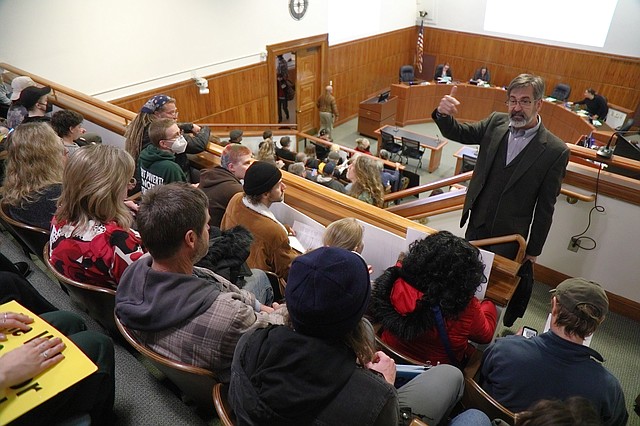 Bellingham City Council President Michael Lilliquist speaks to protesters about rules regarding the display of signs brought into the meeting. (Hailey Hoffman/Cascadia Daily News)
Bellingham City Council President Michael Lilliquist speaks to protesters about rules regarding the display of signs brought into the meeting. (Hailey Hoffman/Cascadia Daily News)
Before Monday night’s meeting, about 50 people rallied at City Hall to show their opposition to the drug-use ordinance. Among those standing on the City Hall steps was Eve Smason-Marcus, a 2021 city council candidate.
Smason-Marcus questioned whether programs such as LEAD would have enough capacity to handle the influx of new clients brought in by the new drug-use ban.
Rather than expand police powers, Smason-Marcus said, the city should focus on creating safe spaces for drug users and, in the longer-term, reducing barriers to housing.
“It just feels like they’re focusing on the wrong part of the issue,” they said.
A previous version of this story incorrectly described the city prosecutor’s role in placing people into the Law Enforcement Assisted Diversion program. The city prosecutor can refer people into the voluntary program, not enroll them directly. The Cascadia Daily News regrets the error.
This story was updated at 1:47 p.m. April 11 to include additional information.




